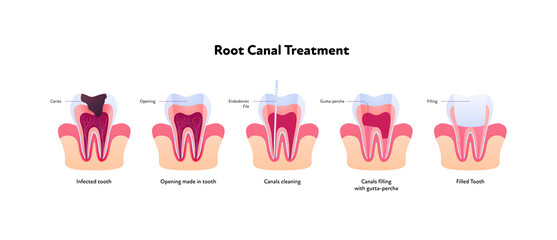Our program
Comprehensive Guide to Root Canal Treatment
Root Canal Treatment (RCT) is a common dental procedure designed to save and restore damaged or infected teeth. This highly effective treatment is crucial for alleviating pain, preventing further complications, and preserving natural teeth. Below, we’ll explore the key aspects of Root Canal Treatment, from understanding the procedure to its benefits and aftercare.

Why us
When is Root Canal Treatment Needed?:
Root Canal Treatment is a specialized dental procedure performed by an endodontist. It involves removing the infected or damaged pulp (the innermost part of the tooth) and then cleaning, shaping, and sealing the root canals. The tooth is then typically crowned to protect it and restore its functionality.
Severe Toothache
Persistent, severe toothache, especially when triggered by hot or cold beverages, can indicate the need for a root canal.
Sensitivity to Pressure or Touch
Sensitivity or pain when biting down or applying pressure on a specific tooth may be a sign of root canal issues.
Swelling and Tenderness
Swelling, tenderness, or a pimple-like bump on the gum near the affected tooth may indicate infection.
01
The Root Canal Procedure
Anesthesia: The procedure usually begins with local anesthesia to ensure the patient is comfortable and pain-free during the process.
Access and Cleaning: The dentist creates an opening in the tooth to access the pulp chamber. Using small instruments, they remove the infected or damaged pulp.
Shaping and Disinfection: The root canals are carefully shaped and cleaned to eliminate any remaining bacteria or debris.
Sealing the Canals: The cleaned canals are then sealed with a biocompatible material (usually gutta-percha) to prevent reinfection.
Restoration: Depending on the extent of damage, a crown is often placed over the treated tooth to provide strength and protection.
02
Benefits of Root Canal Treatment:
Preservation of Natural Teeth: RCT allows for the preservation of a patient's natural tooth, maintaining the overall integrity of the dental arch.
Pain Relief: It alleviates the severe pain associated with infected or damaged pulp, providing significant relief.
Prevents Spread of Infection: By removing the infected pulp and sealing the canals, RCT prevents the spread of infection to surrounding tissues.
03
Post-Treatment Care and Maintenance
Regular Dental Check-ups: Routine dental visits are crucial to monitor the treated tooth and ensure it remains healthy.
Maintaining Oral Hygiene: Proper oral hygiene practices, including brushing, flossing, and using an antimicrobial mouthwash, are essential for long-term success.
Avoiding Chewing Hard Objects: Patients should avoid chewing on hard objects to prevent any potential damage to the treated tooth.
Root Canal Treatment: Preserving Teeth, Relieving Pain, and Enhancing Oral Health
Unveiling the Benefits of Root Canal Treatment
01
Improved Oral Health and Overall Well-being:
Root Canal Treatment not only addresses the immediate issue of infection or damage but also contributes to overall oral health.
02
Natural Appearance and Functionality:
Unlike tooth extraction, which may require replacement with dentures, bridges, or implants, Root Canal Treatment allows patients to retain their natural tooth.
03
Cost-Effectiveness in the Long Run:
While the initial cost of Root Canal Treatment may seem higher compared to tooth extraction, it proves to be a cost-effective solution in the long run. Root Canal Treatment, coupled with a well-maintained crown, can last a lifetime.
Root Canal Treatment is a valuable dental procedure that offers a range of benefits, from preserving natural teeth to enhancing overall oral health. When performed by a skilled and experienced dentist, it provides long-lasting relief from pain and restores the functionality of the affected tooth. By choosing Root Canal Treatment, patients can enjoy the advantages of a healthier, pain-free smile for years to come.
